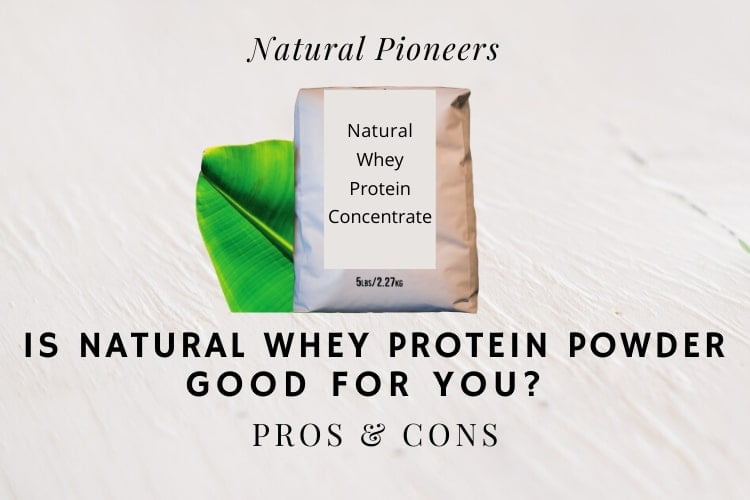
There is a lot of debate whether whey protein powder is natural and healthy. This article will clear up all confusion and provide you with a comprehensive, science-backed list of pros and cons.
Whey protein is a natural product and good for your health. Studies compiled benefits mainly in the areas of weight management, active aging, growing & keeping muscle mass, immune health, cancer, diabetes & intestinal health. Whey protein in organic quality shows superior health benefits.
Let’s see what science has in store about natural whey protein powder.
1. What Is “Natural” Whey Protein Powder?
Let’s get straight to the point: Whey protein powder originally comes from milk, which is a product nature provides us with, and “natural” is defined by the USDA (United States Department of Agriculture) as:
Food labeled “natural”, does not contain artificial ingredients or preservatives and the ingredients are only minimally processed. “Natural” and “All-Natural” are identical.
So far so good.
That means generally, when left to its natural state, whey protein powder is a natural product. Once you know how it’s made, you’ll understand even better.
Let’s take a look at how whey protein powder is made:
- Dairy Farm: It all starts at a dairy farm.
- Milking Parlor: Cows are brought into a specialized area for milking two to three times per day. Now we have milk.
- Transportation: Liquid tankers are used to transport the milk from the dairy farm to a manufacturing facility.
- Separation: Upon arrival at the manufacturing facility the milk is tested for safety. Fun fact: Whey protein is made during the process of producing cheese. Special enzymes are added to the milk to create the separation of curds and the liquid whey.
- Processing: The liquid whey is then pasteurized (heated to kill bacteria) and dried into a powder form. Microfiltration is used in order to remove unwanted fat and lactose.
That’s it, we have whey concentrate. That’s all the steps it takes.
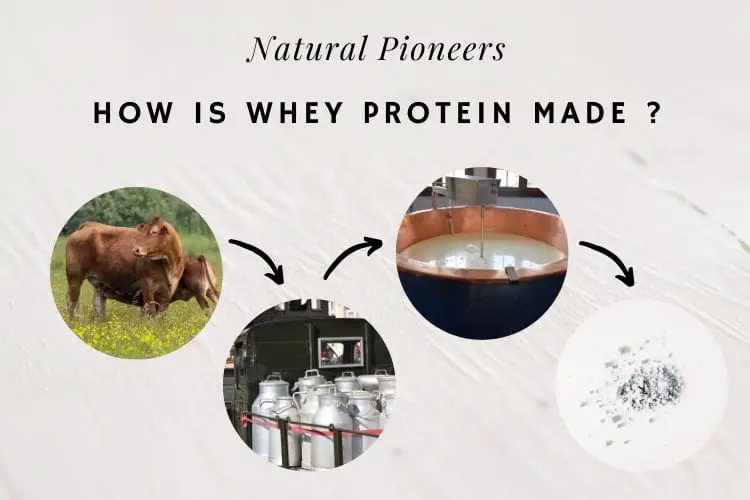
Some manufacturers take it a step further and process natural whey concentrate to whey isolate and whey hydrolisate.
- Whey Isolate: Ion exchangers isolate protein from reining carbs and fat and then filtered again to achieve a higher protein ratio)
- Whey Hydrolisate: We start with whey isolate and add enzymes to break the proteins down into smaller peptides. The protein gets pre-digested which can make it easier to digest (especially for people with digestion problems)
Whey protein concentrate is natural. It is a side product when making cheese. It is heated and filtered after that.
The further it is processed from that point, the more we diverge from whey concentrate’s natural state.
What most people mean when they say “natural” whey protein, is that it doesn’t contain any artificial or synthetic ingredients or toxins.
At this point, it’s important to be able to distinguish “natural” from “not natural” whey protein powder.
That’s something you only need to learn once in your life – you’ll be able to make the right choice when ordering a natural whey protein powder from now on.
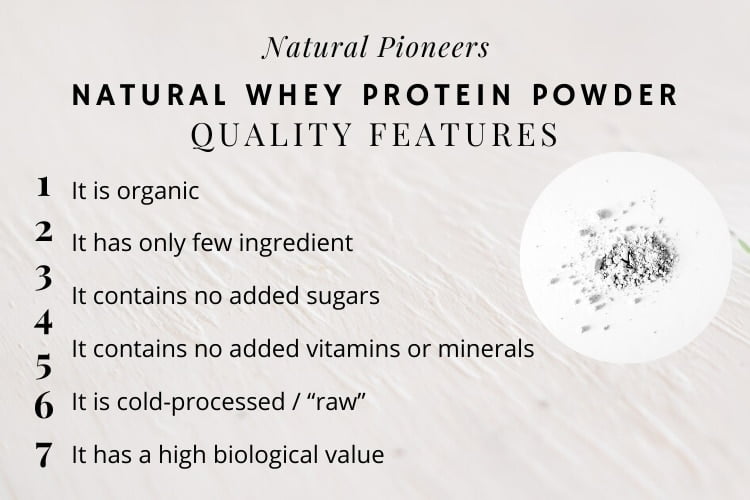
Quality Features Of Natural Whey Protein
1. It is organic
Only organic whey protein powders provide significantly higher amounts of nutrients:
- Significantly higher amounts of polyunsaturated fatty acids (+23%) and omega-3’s (+57%) due to the high-grazing diet [1]; [2]; [3]; [4]; [5]
- Higher concentrations of α-linolenic acid (ALA) +69%, and conjugated linoleic acid (CLA) 41% [6]; [7]
- Significantly higher omega-3 to -6 ratio [8]
Moreover, opting for organic protects you. Here’s how:
- Reduced risk of allergic disease [9]
- Reduced risk of overweight and obesity [10]
- Lower incidence of pesticide residues [11]; [12]
- Reduction in the risk of overall cancer [13]
- No contact with antibiotic resistant bacteria which can promote antibiotic resistance in humans [14]; [15]; [16]
Please keep in mind that there are a ton of products out there that show misleading claims. All organic products are automatically Non-GMO.
But non-organic products with only the Non-GMO seal come with the full spectrum of disadvantages for our health.
Take-away: Only organic whey protein powders provide natural products without toxic residue. Organic natural whey protein powder is produced without antibiotics, growth hormones, and pesticides. Non-organic “grass-fed whey protein powder” may still come from cows treated with antibiotics, hormones, and pesticide-treated, GMO feed.
2. It has only few – ideally just one – ingredient
Unless you look for a flavored option – and we’ve tried some fantastic ones – your ingredient list should be minimal. Ideally, it should only consist of one ingredient: Organic whey protein concentrate.
Often, manufacturers add sunflower or soy lecithin. Lecithin is used as an emulsifier.
When looking for flavored natural whey protein powder, make sure you keep the ingredient list small as well. It should contain no more than: Organic Whey Protein Concentrate, Stevia, Chocolate Flavor (and perhaps some sort of Lethicin)
Take-away: Natural organic whey protein powder has a minimal list of ingredients.
3. It contains no added sugars
It seems like common sense, but we need to say it anyways: Avoid a product with added sugar at all cost.
If you opt for a protein powder that’s flavored – and some taste truly awesome – make sure it’s sweetened with organic stevia. And to forestall a frequently asked question, “organic sugar” makes it no less bad for your health.
Take-away: Natural organic whey protein powder is unsweetened or sweetened with stevia.
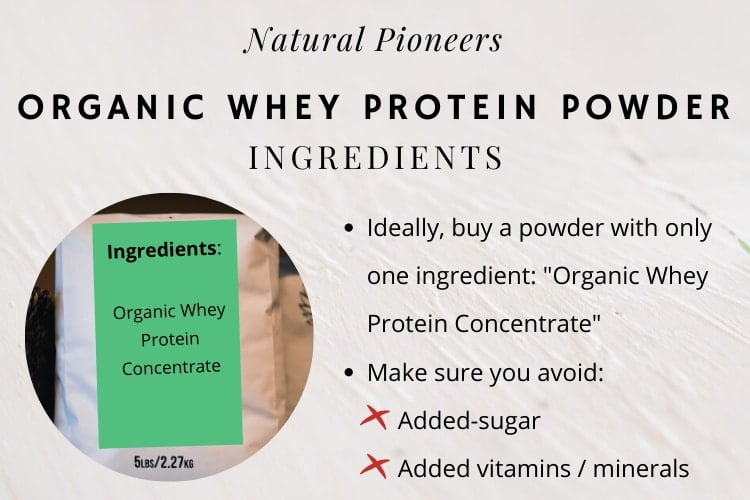
4. It contains no added vitamins, minerals, etc.
Generally, we at Natural Pioneers prioritize a nutrient rich, organic diet full of vegetables and healthy protein. We love to add a little fruit and grains to that – but that’s mostly it.
We strongly believe that – when your diet is on track – there is no need for supplementation. When buying products with a lot of added minerals, vitamins, etc. it’s easy to lose track how much we actually consumed of a certain supplemental mineral.
It all adds up and we might be overdosing consistently. If you choose to supplement with minerals, vitamins or the like, make sure you choose only one product that you take on a daily basis or as prescribed by your doctor.
Take-away: Natural organic protein powder contains no added minerals, vitamins, etc.
5. It is cold-processed or “raw”
Whey protein denatures when heated above 167 ° F. The molecular structure changes and the protein often becomes indigestible.
Therefore, it’s important that your protein powder is “raw” or cold-processed.
Take-away: Natural organic protein powder is cold-processed / “raw”.
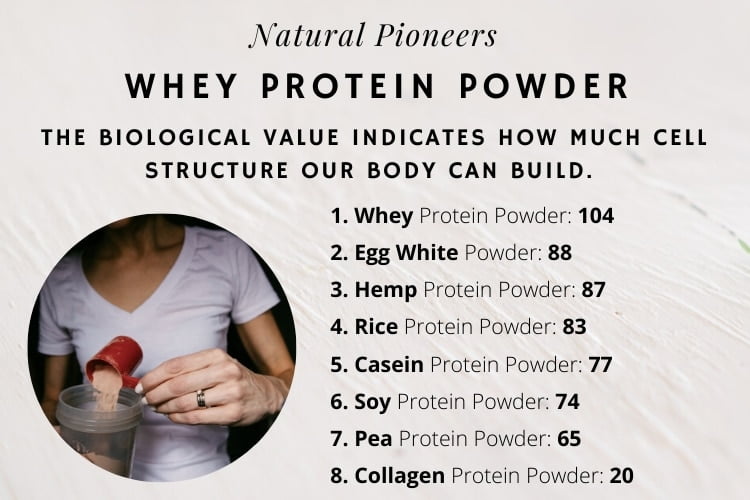
6. It has a high biological value
If you’ve followed all the instructions above, there should be no reason for your protein powder to have a low biological value.
This part is especially crucial if you’re thinking about choosing a natural plant-based protein powder.
The biological value indicates how much cell structure our body can build from a certain amount of protein. The higher the biological value, the less protein we need.
A protein powder should primarily contain essential amino acids that our body cannot produce itself. If your protein powder contains too many non-essential amino acids, this only loads your body with too much urea – which is a toll on our kidneys.
Let’s look at the biological value of common protein powders to understand what is the most natural fit for our cells.
Biological value of common types of protein powder (the higher the number, the better)
- Whey Protein Powder: 104
- Egg White Powder: 88
- Hemp Protein Powder: 87
- Rice Protein Powder: 83
- Casein Protein Powder: 77
- Soy Protein Powder: 74
- Pea Protein Powder: 65
- Collagen Protein Powder: 20
You see, there’s a good reason to choose whey protein. Whey protein powder comes with the highest biological value while providing an extensive list of benefits – for literally anyone, whether you exercise or not.
Take-away: Choosing organic whey protein powder automatically provides the most natural fit for our cells. Whey has a higher bioavailability than plant-based protein powders. Therefore, it is more readily available in our cells.
Curious about the price of a high quality natural whey protein powder that meets all these quality attributes? You can find high quality products for as little as 0.05 USD /g of protein.
Conclusion: When wanting to order a natural whey protein powder, make sure it shows all natural quality features:
– It is organic
– It has only few – ideally just one – ingredient
– It contains no added sugars
– It contains no added vitamins, minerals or the like
– It is cold-processed / “raw”
– It has a high biological value
2. Pros: 14 Evidence-Based Benefits Of Whey Protein
Hundreds of studies have researched the topic of whey protein powder over the past decades.
All compiling a large list of benefits mainly in the areas of weight management, active aging, growing and keeping muscle mass, immune health, cancer, diabetes, and intestinal health. [17]
Here’s the list of proven benefits of whey protein powder:
Pro #1: Natural whey protein powder aids weight management
Whey protein is very satiating (filling), even more so than other types of protein like casein or soy. This makes it a useful addition when trying to loose weight. [18]; [19]
Moreover, studies show that using whey protein powder results in a reduction in calories consumed and an increase in metabolism, while maintaining muscle mass. [20]; [21]; [22]; [23]
Pro #2: Natural whey protein powder benefits active aging
Studies show whey protein helps prevent of age-related muscle loss. Subjects showed improved strength and an overall better-looking body when using whey protein. [24]
Pro #3: Natural whey protein powder helps maintain and grow muscle mass
Studies show that whey protein spares lean muscle mass when losing weight. [25] For muscle growth, whey protein is superior to other types of protein, like casein or soy. [26]; [27]
Pro #4: Natural whey protein powder aids exercise performance
In resistance-trained individuals, whey protein supplementation results in greater whole body protein balance over a 24 h recovery period and enhances exercise performance and recovery. [28]
Pro #5: Natural whey protein powder in organic quality provides additional health benefits
- Significantly higher amounts of polyunsaturated fatty acids (+23%) and omega-3’s (+57%) (EPA+DPA+DHA) due to the high-grazing diet [29]; [30]; [31]; [32]; [33]
- Higher concentrations of α-linolenic acid (ALA) +69%, and conjugated linoleic acid (CLA) 41% [34]; [35]
- Significantly higher omega-3 to -6 ratio [36]
- Organic dairy consumption resulted in higher CLA levels in breast milk of their mothers [37]
Moreover, opting for organic whey protein powder shows a strong protective effect:
- Reduced risk of allergic disease [38]
- Reduced risk of overweight and obesity [39]
- Lower incidence of pesticide residues [40]; [41]
- Reduction in the risk of overall cancer [42]
- No contact with antibiotic resistant bacteria which can promote antibiotic resistance in humans [43]; [44]; [45]
Pro #6: Natural whey protein powder has anti-cancer properties
Studies strongly suggest an anti-tumor effect of a whey protein in some urogenital cancers. [46]
Pro #7: Natural whey protein powder is helpful when treating type 2 diabetes
Whey protein has a moderating effect on blood sugar, and helps increase insulin sensitivity in type 2 diabetes patients. [47]; [48]; [49]
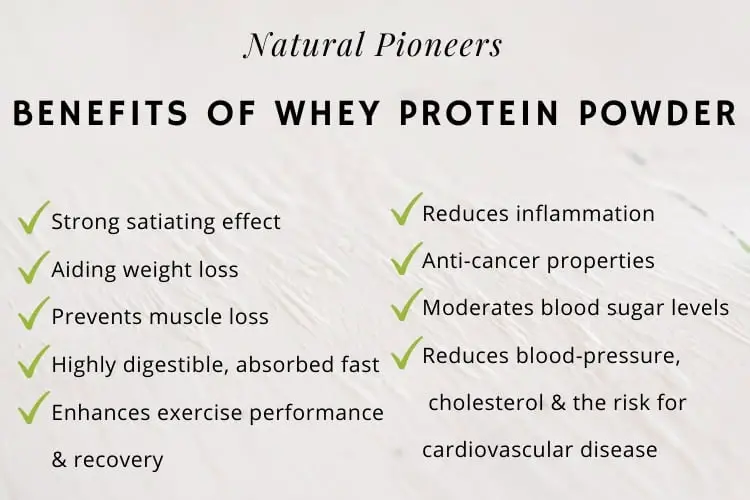
Pro #8: Natural whey protein powder benefits our intestinal health
Whey protein can promote gut health and shows added benefits over traditional fiber-based prebiotics [50]
Pro #9: Natural whey protein powder helps lower blood pressure
Studies show that whey protein powder effectively reduces blood-pressure and the risk for cardiovascular disease [51]; [52]; [53]; [54]
Pro #10: Natural whey protein powder helps lower cholesterol
Studies confirm whey protein powder effectively lowers cholesterol levels [55]
Pro #11: Natural whey protein powder benefits immune health
For immune health, the effects of whey protein powder prove to be essential for optimal immune function and recovery from intense periods of training. [56]
Pro #12: Natural whey protein powder is highly digestible and absorbed quickly
Studies show that whey protein powder is highly digestible and absorbed more quickly compared to other types of protein [57]; [58]; [59]
Pro #13: Natural whey protein powder has a long shelf-life and is widely useful
Natural whey protein powder lasts for 9-19 months and can be used in shakes, smoothies, stirred into yogurt, baking and more.
Pro #14: Whey protein powder is a high quality protein
With a biological value of 104, whey protein powder is superior to plant-based protein powders. Therefore, it is more readily available in our cells. Moreover, different from plant-based powders, it contains all essential amino acids that our body cannot produce itself.
3. Cons: 6 Dangers Of Whey Protein Supplementation
Con #1: Natural whey protein powder may cause digestive distress
When consuming very high doses, people with milk allergies may experience: stomach pains, cramps, reduced appetite, nausea, headache, and fatigue. [60]
You can pair whey protein with a digestive enzyme, which will assist in breaking it down further so that your body is better able to digest and absorb the necessary nutrients and naturally occurring amino acids, which may help reduce bloating. [61]
Con #2: Natural whey protein products high in added sugars may cause weight gain
Without checking the ingredients, you might accidentally buy a product with a lot of added sugars (as much as 23 grams per scoop). The risk: weight gain and an unhealthy spike in blood sugar.
The American Heart Association recommends a limit of 24 grams of added sugar per day for women and 36 grams for men. If you opt for a protein powder that’s flavored, make sure it’s sweetened with organic stevia. [62]
Con #3: Low quality whey protein products may be contaminated
Without paying attention to quality seals like USDA Organic, you might choose a product that contains heavy metals, bisphenol-A (BPA), pesticides, or other contaminants with links to cancer and other health conditions. [63]
Make sure you check your product for the quality features discussed in chapter 1 to avoid toxins.
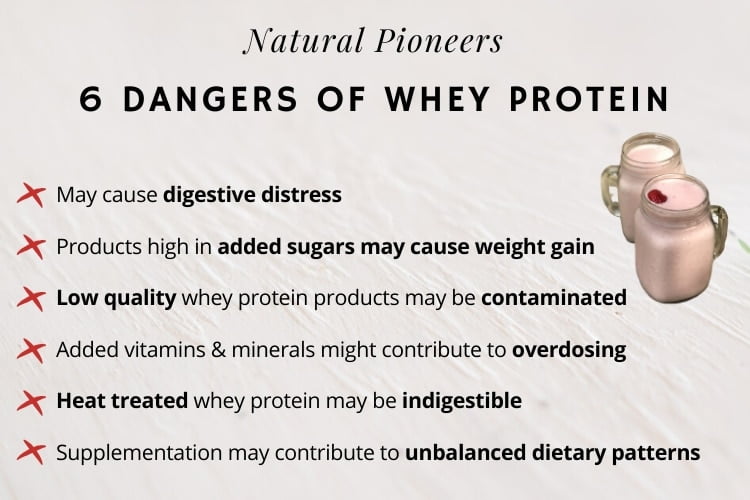
Con #4: Whey protein powder with added vitamins might contribute to overdosing
Whey protein products with a lot of added minerals, vitamins, etc. easily have us lose track of how much we actually consumed of a certain supplemental mineral.
If you choose to supplement with minerals, vitamins or the like, make sure you choose only one product that you take on a daily basis or as prescribed by your doctor.
Con #5: Whey powder that has been heat treated might be indigestible
Whey protein denatures when heated above 167 ° F. The molecular structure changes and the protein often becomes indigestible. Therefore, it’s important that your protein powder is “raw” or cold processed.
Con #6: Supplementation may contribute to unbalanced dietary patterns
Dietary supplements should not be used as a substitute for a nutritious and balanced diet.

